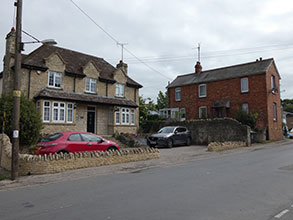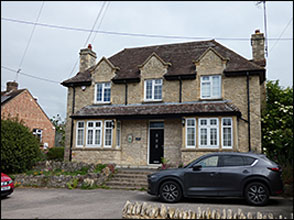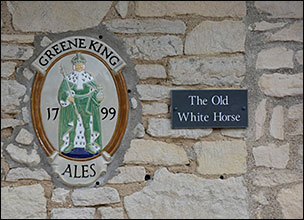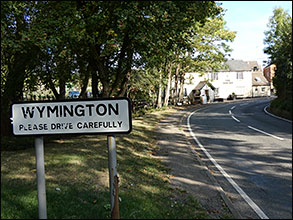|
|||||||||
| Article and photos by Paul Wright, 2020 |
|||||||||
|
White Horse Inn Closure
|
|||||||||
|
|
|||||||||
|
|||||||||
|
For many years Wymington enjoyed the choice of two public houses, one being the New Inn, and the White Horse, which later would take on a more modern design. Back in 1861 it was reported that Mr Esau Whiteman was a 36 year old selling beer and baking bread at the White Horse. There was a block of cottages standing at the rear of the pub, and they were built in about 1865. In the census of 1891, it was occupied by William Lewis, he diversified his duties as a Farmer, Baker and Publican, he was aged 43, and born over at Isham near Kettering. The 1911 census informed us that the “White Horse Inn consisted of 6 rooms, and was occupied by William Lewis, he was a Farmer and Innkeeper aged 69, who was born in Brigstock, Northants.”
The old house was demolished just before WWII and a modern public house was built on the site for Wells and Winch of Biggleswade. From my time growing up in the village from the 1950s it was run by Charlie Desborough and his family. And just about every evening without fail, a group of us would congregate under the street light on the car park on the frontage. We would nip in to the of sales, at the top of the steps to buy Smith’s crisps, (containing the little blue bag of salt), and maybe a ‘Vimto”. Mrs Desborough would have the task of tending to our constant requests during the evening; this entailed sliding the frosted glass window open to see what we wanted, and she would be pretty snappy with us at times! The Walkers crisps story began with Mr. Henry Walker, a successful butcher from Mansfield, he then relocated in the1880s to run a shop in Leicester. Walker's operation eventually began making meat pies. Walker started a new sideline when postwar rationing made meat scarce. Under the guidance of managing director R.E. Gerrard, in 1948 the firm began frying potato slices in a fish fryer. When meat rationing ended in 1954, the company continued making its popular crisps, introducing its best-selling cheese and onion flavoured variety the same year. In the 60s and 70s Walkers and Son developed three additional flavours to match the taste buds of the nation:
The company has been owned by “Pepsi” since 1989, and to keep up with the ever increasing demand, their factories only close on Christmas day and Boxing day each year. In 1993 the two popular brands of Smith’s crisps and Walkers crisps were merged. Currently 13 million bags of snacks a day are produced at Walkers’ four sites in the UK. 10 million are produced in Leicester. Every year 340,000 tonnes of potatoes are used, and they these are provided by 300 UK farmers. Both Wymington public houses were served by the same brewery. During my youth in the village, I recall the beer, and pop for us kids, being delivered on a wagon from “Wells and Winch”, who were based in “Biggleswade”. The brewery had a very long history, and dated back to 1764, when it was founded by a Mr Samuel Wells, and the Winch family came on board back in 1898. This was when Mr Winch came up from Kent looking for a business venture for his son to run. Alas that firm was swallowed up by Bury St Edmunds brewers "Greene King" in 1961, along with 287 of their public houses. The brewery at Biggleswade was used mainly as a bottling plant until that closed. The bright green signage of Asda supermarket’s can now be seen on the former brewery site in Church street in Biggleswade. The architectural design of the White Horse was also shared locally by “The Kings Arms” at Turvey, but that closed its doors in 1997, and the “Cock Inn” at Pavenham, as far I know this is still open (?) and the “Old Plough” at Felmersham, which closed in 1991. Figures according to the Campaign for Real Ale (CAMRA) showed that 28 pubs were closing per week in 2011 in the lead up to the White Horse closure. By contrast, the latest figures for 2019 show the number of pubs closing their doors has now dropped a bit. But will no doubt change after this Coronavirus pandemic has taken it’s toll on our country as we know it? Greene King is now one of the very big boys, and currently has over 3000, pubs, restaurants and hotels in its portfolio. So after several managers coming and going, and the subsequent temporary closures, the White Horse closed the stable doors in 2012 for the last time. It was then totally revamped, to be used as a private dwelling circa 2015, and came on the market for £435,000. During August 2019, Greene King had agreed to be taken over by a firm from Hong Kong called “CKA”. The Suffolk brewer currently runs around 2,700 pubs, hotels and restaurants in the UK, and is valued at £2.7 billion. But in the early part of 2020, the UK and the world is gripped in a Covid-19 pandemic, this is causing the deaths of many 1000’s per day. The source of the coronavirus (Covid-19) is believed to be a so called "wet market" in Wuhan in China, which sold food from questionable sources. In a major development here, this saw Cafes, pubs and restaurants being closed from Friday night March 20th, 2020, this was except for take-away food - to tackle coronavirus, Prime Minister Boris Johnson had said. All the UK's nightclubs, theatre’s, cinemas, gyms and leisure centre’s have also been told to close "as soon as they reasonably could.” Mr Johnson said the situation would be reviewed each month. Meanwhile, the government said it would pay 80% of wages for employees who are unable to work, this would be up to £2,500 a month. At the end of March 2020, Prime Minister Boris Johnson had tested positive for coronavirus and had been self-isolating in Downing Street. He said he had experienced mild symptoms over a 24 hours period, including a temperature and cough, but would continue to lead the government. Things then changed for the worse on 5th April, when Mr Johnson was admitted to hospital regarding the state of his health. He then spent three nights in intensive care. The prime minister was moved out of intensive care on Thursday evening on 9th April, but remained in hospital, Downing Street had said. He had been receiving treatment for coronavirus at St Thomas' Hospital in London since the previous Sunday. Mr Johnson, 55, came out of hospital on Sunday 12th April. The health situation is getting more serious, with a temporary mortuary being opened on the site of the former recycling centre at Wollaston. This closed in 2017 to members of the public, the unit is on standby from Sunday 12th April, 2020, and could have a capacity for 1100 bodies. It was back to 24th July 2019, the day following Johnson's election as Conservative Party leader, Queen Elizabeth II accepted Theresa May’s resignation and appointed Boris Johnson as prime minister. At the White Horse the old colourful Greene King porcelain sign still survives on the left hand side at the top of the steps. This is a reminder that this was a North Bedfordshire pub. Currently just one hundred yards down the road, The New Inn has been totally revamped, with a vast investment being made by John Frankiewicz, and was all completed in the autumn of 2019.
|
|||||||||



